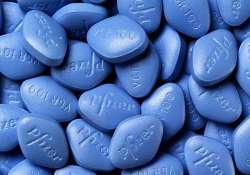Viagra also busts obesity
Berlin: Researchers treating mice with Viagra have made an amazing discovery -- the drug potentially busts the unseemly fat around the abdomen, besides lowering risk of other obesity related complications.Sildenafil -- better known as Viagra

Berlin: Researchers treating mice with Viagra have made an amazing discovery -- the drug potentially busts the unseemly fat around the abdomen, besides lowering risk of other obesity related complications.
Sildenafil -- better known as Viagra -- is used to treat erectile dysfunction (ED). This substance prevents degradation of cyclic guanosine mono-phosphate (cGMP), which then ensures blood supply for an erection.
"We have been researching the effect of cGMP on fat cells for quite some time now. This is why sildenafil was a potentially interesting candidate for us," says Alexander Pfeifer, professor of pharmacology and toxicology at the University of Bonn, who led the study.
However, another effect of Viagra has been noticed quite some time ago. Mice given sildenafil over longer periods of time were resistant to obesity when fed with high-fat diet, the Journal of the Federation of American Societies for Experimental Biology reports.
Together with the PharmaCenter of the University of Bonn, the German Federal Institute for Drugs and Medical Devices (BfArM), and the Max Planck Institute for Heart and Lung Research, the team of Pfeifer studied the effect of sildenafil on fat cells in mice, according to a Bonn statement.
Researchers administered the ED drug to the rodents for seven days. "The effects were quite amazing," says Ana Kilic, Pfeifer's colleague. Sildenafil increased the conversion of white fat cells, which are found in human "problem areas", into beige ones in the animals.
"Beige fat cells burn the energy from ingested food and convert it to heat," says Pfeifer. Because the beige fat cells can "melt the fat" and thus fight obesity, researchers are very hopeful for their potential.
If white fat cells are further "stuffed" or accumulate lipids, they increase in size and can synthesize and release hormones which in turn cause inflammation. Thus increasing the risk for chronic diseases.
Such inflammatory responses may then lead to cardio-vascular diseases resulting in heart attacks and strokes, as well as cancer and diabetes. "It seems that sildenafil prevented the fat cells in these mice from getting onto that slippery slope," Pfeifer says.
Sildenafil -- better known as Viagra -- is used to treat erectile dysfunction (ED). This substance prevents degradation of cyclic guanosine mono-phosphate (cGMP), which then ensures blood supply for an erection.
"We have been researching the effect of cGMP on fat cells for quite some time now. This is why sildenafil was a potentially interesting candidate for us," says Alexander Pfeifer, professor of pharmacology and toxicology at the University of Bonn, who led the study.
However, another effect of Viagra has been noticed quite some time ago. Mice given sildenafil over longer periods of time were resistant to obesity when fed with high-fat diet, the Journal of the Federation of American Societies for Experimental Biology reports.
Together with the PharmaCenter of the University of Bonn, the German Federal Institute for Drugs and Medical Devices (BfArM), and the Max Planck Institute for Heart and Lung Research, the team of Pfeifer studied the effect of sildenafil on fat cells in mice, according to a Bonn statement.
Researchers administered the ED drug to the rodents for seven days. "The effects were quite amazing," says Ana Kilic, Pfeifer's colleague. Sildenafil increased the conversion of white fat cells, which are found in human "problem areas", into beige ones in the animals.
"Beige fat cells burn the energy from ingested food and convert it to heat," says Pfeifer. Because the beige fat cells can "melt the fat" and thus fight obesity, researchers are very hopeful for their potential.
If white fat cells are further "stuffed" or accumulate lipids, they increase in size and can synthesize and release hormones which in turn cause inflammation. Thus increasing the risk for chronic diseases.
Such inflammatory responses may then lead to cardio-vascular diseases resulting in heart attacks and strokes, as well as cancer and diabetes. "It seems that sildenafil prevented the fat cells in these mice from getting onto that slippery slope," Pfeifer says.